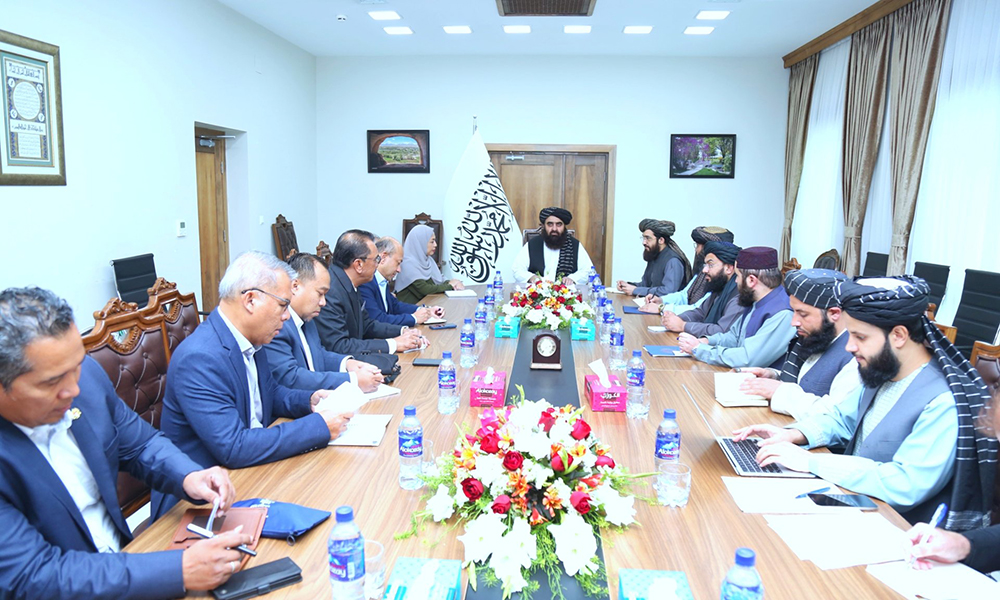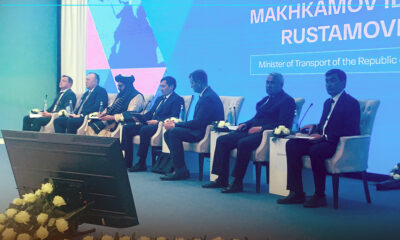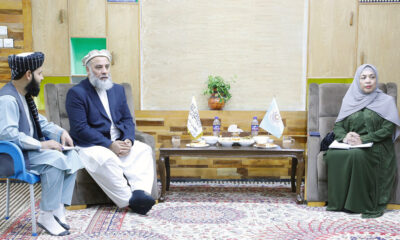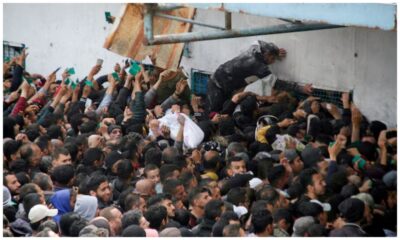Latest News
Abdullah calls on ‘Troika’ members to help tackle resurgent Taliban

In discussions with the international community in Doha, Qatar, the Afghan government has raised its concerns over the Taliban’s brutal attacks on cities, the Ministry of Foreign Affairs said in a statement Thursday.
According to the statement, Afghanistan has raised the issue of these attacks which have led to “war crimes and blatant human rights violations and humanitarian catastrophe in Afghanistan”.
According to MoFA, the Head of the High Council for National Reconciliation Abdullah Abdullah, who is leading the Republic’s negotiating team in Doha, on Wednesday attended the Extended Troika meeting.
Also present at the meeting was the United States, Russia, China, and Pakistan.
“The chairman of the High Council for Reconciliation called on the international community, especially the Troika meeting member states, to adopt serious measures to prevent Taliban attacks on cities, which have led to war crimes, widespread human rights abuses and humanitarian catastrophe.
“Mr Abdullah also stressed the need to start meaningful and sincere negotiations to establish an immediate ceasefire and reach a political agreement,” the statement read.
MoFA said it “reiterates that the continuation of the Taliban’s bloody attacks in collusion with regional and international terrorists will not only lead to a humanitarian catastrophe and the protraction of war in Afghanistan, but also exacerbate violent extremism and incite terrorists in the region posing a serious and irreparable threat to the collective security of the region and the world”.
The statement added that by “stopping the Taliban violence and crimes in direct collusion with regional and international terrorists will be not only in the interest of Afghanistan but in the interest of the whole world, especially the countries of the region”.
The Minister of Foreign Affairs Haneef Atmar also spoke out on Thursday and said the current levels of violence have had a “devastating impact on our country. It has literally disrupted and eroded security, rule of law and public service delivery in over half of our country.
“The loss of critical terrain and also cross-border trade points have had a significant impact on the humanitarian situation, and then trade and market functioning in the country, we’ve lost already since mid-April over 6,000 people,” he said.
Atmar also stated that at least 4,000 “of our brave national security forces and over 2,000 from the civilians,” have been killed.
He said if one tallies the wounded in this time, it amounts to over 15,000.
Atmar said that “over the past couple of months, this is the highest figure we have ever experienced. Over the past two decades the humanitarian crisis is overwhelming with over 18 million of our people now facing hunger and in need of immediate humanitarian assistance because of the devastating impact of the recent wave of terror and violence, the combined effects of the COVID-19 pandemic and the drought have been exacerbated by the way of the recent wave of violence”.
Latest News
Over 1,000 Afghan refugees forced out of Pakistan in one day

The Ministry of Refugees and Repatriations (MoRR) says over 1,000 Afghan migrants were forcibly returned from Pakistan on Tuesday through Spin Boldak border crossing in Kandahar province, the ministry said in a statement.
The ministry stated that based on information provided by the Spin Boldak Kandahar border command, these returnees comprised 191 families, totalling 998 people.
In addition, three migrants released from Pakistani prisons were also returned, according to the statement.
The statement added that after registering the returnees, the refugees were referred to the offices of the International Organization for Migration (IOM), the World Food Program (WFP) and the United Nations High Commissioner for Refugees (UNHCR).
Each family received 10,000 afghanis – paid to them by the Islamic Emirate.
In another statement, the ministry said that 2,783 migrants living in Iran voluntarily and forcibly returned to the country during this week.
Latest News
Afghanistan’s minister of transport and aviation attends regional meeting in Uzbekistan

Hamidullah Akhundzadeh, acting Minister of Transport and Aviation, headed a delegation to Uzbekistan for a ‘Six-Party Corridor’ meeting that included representatives from Afghanistan, Russia, Belarus, Pakistan, Kazakhstan and Uzbekistan.
On the sidelines of this meeting the Afghanistan delegation discussed trade through the corridor with the other five relevant countries.
According to the ministry of transport and aviation, Akhundzadeh met with the deputy ministers of transport of Russia and Belarus.
He also discussed ways to expand transit between Afghanistan and Russia; and Afghanistan and Belarus, and provide the necessary facilities to achieve this.
The ministry added that the acting minister had a bilateral meeting with the Minister of Transport and the Special Representative of the President of Uzbekistan on Afghanistan and discussed the expansion of road transport between the two countries.
Latest News
Malaysian delegation arrives in Kabul for talks with government

Representatives of Malaysia’s ministries of foreign affairs, defense and interior and advisors of the Malaysian Prime Minister and the Special Representative of Malaysia for Afghanistan arrived in Kabul this week for meetings with a number of high-ranking officials.
The Islamic Emirate’s foreign minister Mawlavi Amir Khan Muttaqi met with the delegation and thanked Malaysia for assistance it has provided over the past few years, including aid for the victims of the deadly Herat earthquake.
Muttaqi said in the meeting that existing diplomatic, religious, cultural and economic relations between the people and governments of Afghanistan and Malaysia were expanding.
“There are business and investment opportunities in various fields,” Muttaqi told the delegation.
“Afghanistan follows a balanced and economy-oriented foreign policy in the political and economic field. Afghanistan’s relations with the international community are expanding and it has established good relations with neighboring and regional countries,” said Muttaqi.
Afghanistan is keen to expand its relations with the countries of Southeast Asia, he added.
Muttaqi further said: “The Afghan government wants the Malaysian government to provide health and education facilities for the 3,000 Afghans currently living in Malaysia.”
At the same time, members of the Malaysian delegation said that the Malaysian government wants to expand relations with Afghanistan in various fields.
The delegation positively evaluated the political situation in Afghanistan and said they hoped a Malaysian trade delegation would visit Afghanistan in the near future.
One delegate, Dato Shazlina said: “Malaysia is determined to organize short-term training programs for Afghan diplomats, training programs in the field of information technology, accounting and development for Afghan civil service employees and in this regard cooperate with Afghanistan in organizing professional programs.”
The political deputy prime minister, Mawlavi Abdul Kabir, also met with the delegation and said the Islamic Emirate has achieved much in the economic and political sectors, and that the world, including the region, has no need to be concerned about Afghanistan.
-

 Sport4 days ago
Sport4 days agoAfghanistan Champions League kicks off with grand opening ceremony
-

 Latest News3 days ago
Latest News3 days agoPakistan’s frontiers minister stresses ‘dignified’ return of Afghan refugees
-

 Regional5 days ago
Regional5 days agoIran’s foreign minister downplays drone attack, says Tehran investigating
-

 Business4 days ago
Business4 days agoAfghanistan’s economic prospects are bleak: World Bank
-

 Latest News4 days ago
Latest News4 days agoMore than 800 Afghan refugees deported from Pakistan in two days
-

 Regional2 days ago
Regional2 days agoIranian president lands in Pakistan for three-day visit to mend ties
-

 Climate Change3 days ago
Climate Change3 days agoMassive river flooding expected in China, threatening millions
-

 Latest News4 days ago
Latest News4 days agoChinese keen to invest in Panjshir-Kabul water conduit project

























